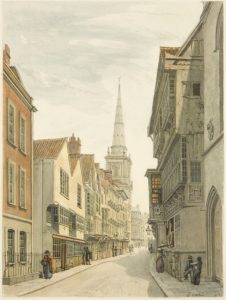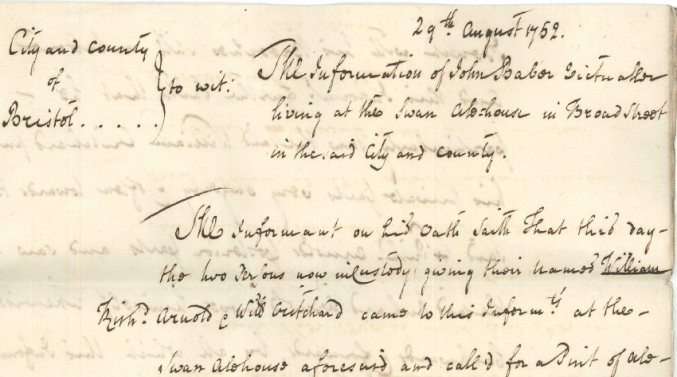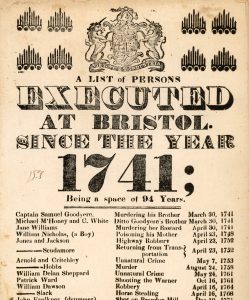Rare witness statement reveals tragic story of executed gay couple
Posted on by Alice Bush.
By Mary Milton, Archives Officer, Bristol Archives
Staff at Bristol Archives have made an important discovery about the case of William Critchard and Richard Arnold, two men executed in 1753 for what was then described as “the detestable crime of buggery.”
Sexual activity between men was punishable by death until 1861 and remained illegal in England until 1967. A document kept at Bristol Archives sheds new light on the men’s relationship and the encounter that lead to their arrest and execution.
Until now, most of what we knew about Critchard and Arnold was taken from contemporary newspaper reports.

Drawing of a view of Broad Street, 1824. The Swan Alehouse was one of the buildings on the left side of the street, where two men in top hats are standing. (Ref: M2335)
William Critchard (also written Crutchard or Critchley) was described as a young man of around 24, from the west of England, a footman to a gentleman in the city. Richard Arnold was originally from London and described as an older man of “near sixty years of age.” He was the landlord of the Lamb and Flag pub in Temple Street and a “man of substance,” who had “lived in good repute for many years.” At their trial, the two men refused to give up the names of any accomplices, saying that they had confessed their guilt to God and therefore felt it was unnecessary to repeat it to man.
The newspaper Felix Farley’s Bristol Journal gave an account of their execution in September 1753. The article states that “when the cart drew under the gallows, Arnold kissed Critchard’s hand.” The two men signalled their readiness, “by throwing the tufts of flowers from them, the cart drew away and they were soon launched into eternity”.
The new information about the men was found in one of the hundreds of bundles of documents kept by the city’s Town Clerk and now looked after by Bristol Archives. The bundles, dating from the mid eighteenth to mid nineteenth century, include a huge variety of documents: petitions to the Mayor, records concerning taxes and licensing, as well as court records including lists of jurors and prisoners. Staff at the Archives have been reading through the documents to put more detail into their catalogue entries.
On one document, staff recognised the names of Arnold and Critchley and then were astonished to read witness statements used as evidence against the men. John Baber and Joseph Senkell had observed the two men having sex in a private room at the Swan Alehouse in Broad Street, Bristol.

The beginning of John Baber’s witness statement, describing Arnold and Critchard coming to the Swan Alehouse on Broad Street. (Ref: TC/Adm/Box/6/9)
The statement of John Baber, landlord of the Swan Alehouse says, Critchard and Arnold “went into a private room and shut the door, but this informant having some suspicion of their being about some indecent practices looked privately into the said room where he observed both their breeches down…” The statement describes the men having sex, preceded by kissing.
Historian Rictor Norton, a researcher of LGBTQ+ history, says this is a fascinating discovery.
“Usually, the only evidence we are given in court records of sodomy trials is the summary statement that the defendants behaved in such a way as to lead the observer to conclude that they had committed sodomy. But this testimony leaves nothing to the imagination, and not only leaves no doubt about the act itself but shows that it was preceded by kisses and caresses, thus demonstrating that the two men fully consented to the encounter. It’s wonderful to have such evidence of the wider humanity of their relations rather than the bald claim of their criminal act,” he says.

Top half of printed notice listing those executed in Bristol between the years 1741 and 1835. Critchard and Arnold are listed (Critchard as Critchley) as having committed an ‘Unnatural Crime’. (Ref: 12967)
Andy Foyle of OutStories, the LGBTQ+ history group for Bristol, was also excited by the discovery.
“Such discoveries are a rare event. This is a really important step forward in understanding the detailed facts which sadly led to these men being hanged. It shows the importance and value of our city’s fantastic archives and the care taken by the archives staff every day.”
Bristol Archives staff continue to catalogue the Town Clerk collections. The documents related to Critchard and Arnold’s trial and execution are now on display within the Archives’ public searchroom.
If this story has piqued your interest, Bristol Archives has recently published a Source Guide for those wanting to get started researching the LGBTQ+ history of the city.
3 comments on “Rare witness statement reveals tragic story of executed gay couple”
Such a sad story
Very sad! Although so little evidence exists of LGBTQ+ lives from the past. This find is something to be celebrated, despite its tragic nature.
Amazing history documenting stories of the time. So important to remind ourselves that our freedom is what we as Bristolians fought for. How important Pride to mark this. This is even more important now than ever with the ugly rise of nationalism in Europe and suppression of some groups rising it’s ugly head.